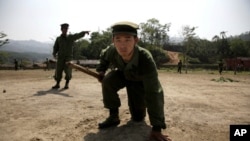Burmese President Thien Sein has called on ethnic militias currently fighting government troops in Burma to hold peace talks with respective state governments -- not the central government -- in a bid to end months of conflict that has displaced as many as 50,000 people in eastern and northern states.
That demand is part of a broader set of policies that analysts say are uniting ethnic militias against the central government.
Speaking to a group of businessmen and members of parliament on Wednesday, the president also accused the ethnic Kachin militia of terrorism and insisted that Burmese troops are only acting defensively in the fighting.
The Kachin milita is part of a broader political alliance of ethnic groups formed in February that includes the Shan, Karen, Mon and Karenni.
Aung Zaw, editor of the Chiang Mai-based Irrawaddy newspaper, says the ethnic armies are more united than in the past because the government has been insisting on a policy to force them to join border patrol forces.
“This is a major blunder from the side of the government: they proposed it and all the ethnic groups [said] we couldn’t accept it because we are not fighting to be an ethnic border guard force or militia. [They said] we want autonomy, we want the respect for the Federal Union [of Burma]. I think this is the source of the problem," Aung Zaw says.
The ethnic militias have demanded that any peace talks must include their whole alliance and must be conducted with the central government, which senior officials have dismissed.
While the impasse over peace talks continues, both the government and Kachin rights groups accuse each other of attacks and human rights abuses.
Earlier this month, a group of female U.S. senators said Burma’s military is using rape as a weapon of war in the Kachin fighting as well as armed conflict in neighboring Shan state. Moon Nay Li is a spokeswoman for the Kachin Women’s Association, a rights group in Kachin state.
“There are many kinds of abuses by the Burmese military troops, one is portering [sic], one is the gang rape to the girl, women and those who are related to the KI [Kachin Independence] Army, they did not ask questions, they arrest. That is illegal arrest. Most villages are afraid of that kind of human rights violations so they flee,” she says.
Some 20,000 Kachin have fled to 15 camps along the China-Burma border. The Shan rights group, the Shan Democratic Union, in a statement, said over 30,000 people had been displaced since fighting began in Shan state in March.
Sally Thompson, a deputy director with the Thailand Burma Border Consortium (TBBC), which assists over 140,000 Burmese in refugee camps in Thailand, says international aid requests to remote areas have been turned down by Burma’s government.
She says the breakdown of a years-long ceasefire with the ethnic groups is an indication that there is little hope for peace talks.
“These areas have been in relative peace and now because they haven’t agreed to the demands to transfer to border guard forces there is no dialogue," Thompson says. "It’s just being met with force.”
Next week, U.N. human rights investigator Tomas Quintana is expected to visit Burma to hold talks with senior officials to assess the human rights situation in the context of the new government.
It is the first time in more than a year that Burmese officials have granted him a visa.




